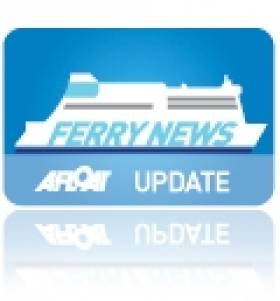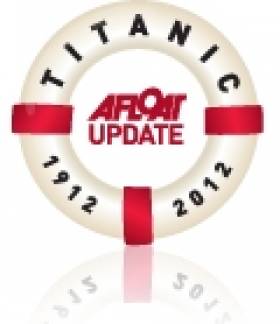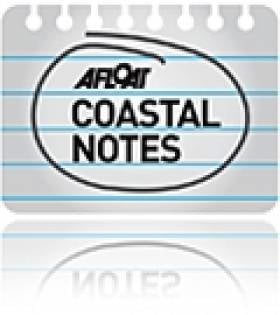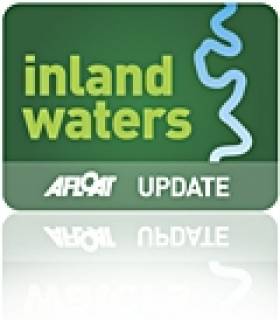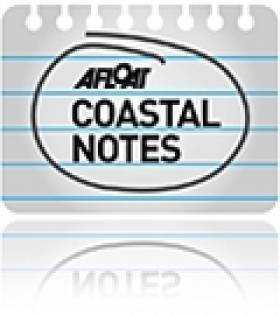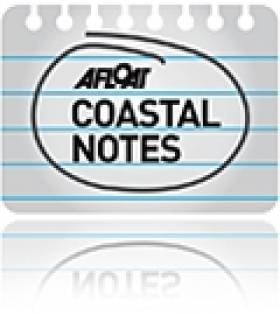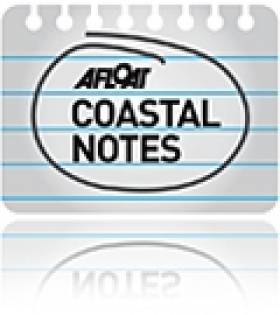Displaying items by tag: Cork
Disruption Continues on Brittany Ferries Services
#FERRY NEWS - Industrial action by French crews with Brittany Ferries is still disrupting the company's ferry services from Cork to Roscoff.
As previously reported on Afloat.ie, a series of wildcat strikes by staff protesting against changes to their working terms and conditions began last Friday 21 September.
The action led to the cancellation of sailings on the weekend-only round-trip Cork route until further notice.
Passengers intending to travel from Cork have been advised to seek passage instead on Celtic Ferries' Rosslare-to-Cherbourg route or Irish Ferries' Rosslare services to Cherbourg.
Titanic Scale Model Focus of High Court Dispute
#TITANIC - A replica of the Titanic is at the centre of a High Court dispute between two former partners, as RTE News reports.
Carmel McGrath claims she paid the costs of constructing the 16ft scale replica of the tragic cruise liner, and has secured an injunction preventing Zoltan Panka, a Hungarian national, from selling the €70,000 model after he removed it from her home in the northern suburbs of Cork.
Panka gave a sworn statement to the court disputing the claims of his former partner, alleging he received abusive messages from her after taking the model.
He denies any intention to sell the replica, currently believed to be at a location in Carrigaline, and repudiates the estimated value of McGrath's investment as well as any commercial relationship between the two.
The Hungarian added that model ship building was a family hobby, and that he had put in as much as 2,000 hours' worth of work into the uncompleted project, which was intended to mark the 100th anniversary of the ship's demise.
RTE News has much more on the story HERE.
Lusitania Owner Rejects TV Doc Findings, Wants Second Dive
#LUSITANIA - The millionaire owner of the Lusitania shipwreck has rejected the findings of the recent TV documentary investigating the mystery of its sinking.
The Irish Independent reports that Gregg Bemis is seeking permission from the Government to mount another dive to the wreck site to "pursue the truth".
On 7 May 1915 the cruise liner RMS Lusitania was hit by a torpedo from a German U-boat off the coast of the Old Head of Kinsale in Co Cork, with the loss of 1,198 lives.
A second explosion was reported minutes later, and within 20 minutes the vessel was underwater. Only 761 people survived.
Last summer Bemis launched what was expected to be the last dive expedition to find out what really happened to the former Cunard passenger liner.
However, Bemis argues that the National Geographic documentary team behind 'Dark Secrets of the Lusitania' used "insufficient data" when they concluded that the second explosion on the vessel following a torpedo strike was from a boiler blowing up in the bowels of the ship.
He remains convinced that a secret cargo of Allied munitions was responsible for the devastating explosion that sealed the ship's fate.
"They did not have all the information they should have had," said Bemis. "They used a computer analysis to get their theory and a computer is only as good as the garbage you put in. You put garbage in, you get garbage out."
The American said only a second dive with complete access to the hull could uncover what he believes really happened - a project he hopes will take place before the Lusitania centenery.
Barryroe Oil Field May Hold Further Resources Says Study
#COASTAL NOTES - The Barryroe field off the south coast of Cork may deliver even more oil than previously anticipated, according to the latest surveys.
The Irish Times reports that Providence Resources has completed an evaluation of its Celtic Sea prospect which indicates that the Lower Wealden and Purbeckian areas could hold an "encouraging" yield of 778 million barrels.
The oil firm's tectnical director told the paper that the focus would remain on the Middle and Basal Wealden sands following its appraisal wells drilled over the spring and summer.
As previously reported on Afloat.ie, seismic data and results from six test wells on the Barryroe site led experts to estimate that the oil field contains as much as 1.6 billion barrels in total - four times as much as previous projections.
The oil flow is expected to be worth billions of euro to the Irish economy over a number of years.
The latest news "further reinforces the prospectivity of the area" according to Davy Stockbrokers, who added that "it also suggests that Barryroe will not be the only development of Purbeckian oil in the Celtic Sea".
Event to Mark Worldwide Release of 'Dark Secrets of the Lusitania'
#LUSITANIA - M3 TV Productions will be holding a special event in the Port of Cork on 14 September to mark the worldwide release of Dark Secrets of the Lusitania.
The TV documentary, which premiered last month on the National Geographic Channel, follows what might have been the last expedition to the wreck of the ill-fated cruise liner.
On 7 May 1915 the passenger liner RMS Lusitania was sunk by a torpedo from a German U-boat off the coast of Cork, with the loss of 1,198 lives. But theories abound that there was more to the disaster than the torpedo strike, and that the ship's cargo hold contained precious art and illegal munitions.
The documentary attempts to uncover what really happened, using the latest submersible technology to see further into the shipwreck than ever before.
Gregg Bemis, the US owner of the shipwreck of the former Cunard cruise liner, will be flying in for the worldwide launch event.
Other guests include representatives from the marine industry, Minister for Arts & Heritage Jimmy Deenihan, Sean Kelly MEP, Senator Deirdre Clune and representatives from the Irish Coast Guard and Naval Service.
Actors will be dressed in First World War period costume to create a special atmosphere on the evening. The Irish Examiner will also display a digital exhibition of photos on the Lusitania, while UCC's Professor Dermot Keogh will give anoverview of that tumultuous period of world history.
Concern Over Fish Kill on Co Cork River
#INLAND WATERWAYS - Fisheries environmental officers at Inland Fisheries Ireland received reports of a fish kill in the Kiltha River in Castlemartyr, Co Cork from anglers late on Saturday 11 August last.
The investigation which initiated early the following morning revealed that many thousands of brown trout fry, parr and adults, salmon fry and parr, brook lamprey, stickleback and stone loach were killed.
The fish kill affected a 5.5km section of the Kiltha River from Mogeely downstream to its confluence with the Dower River.
The Kiltha River is an important salmonid spawning and nursery tributary of the Womanagh River which flows east into the sea at Youghal Harbour. This fish kill is particularly disappointing as the Womanagh River, which is currently closed to salmon angling, had been responding well to management and has seen its fish populations increase over the past several years.
The effects of the pollutant which entered the river were quick-acting, indicating that the pollutant was of a toxic nature.
Inland Fisheries Ireland is awaiting test results of water samples to determine the nature of the pollutant. While this analysis is taking place IFI’s investigation into the cause of the kill is continuing with several potential sources being examined.
The news comes just weeks after reports of fish mortalities along a 9km stretch of the River Vartry in Co Wicklow.
Members of the public are reminded that Inland Fisheries Ireland operates a confidential 24 hour hotline and suspected illegal fishing or pollution can be reported to 1890 347 424 or for easier recall 1890 FISH 24.
Cork Beach Bathing Ban Lifted as E.coli Levels Drop 'Significantly'
#COASTAL NOTES - The bathing ban imposed last week on seven Cork coastal beaches has been lifted, according to RTÉ News.
As previously reported on Afloat.ie, the seven beaches had been closed to swimming over concerns at elevated E.coli levels in the water, resulting from water runoff after the recent heavy rainfall in the county.
Cork County Council took the decision to lift restrictions after tests this week showed E.coli levels had "significantly descreaed" below the EU mandatory safety level.
The seven affected beaches included three in the Youghal area. Redbarn at Youghal joins Garretsown near Kinsale and Garryvoe in the beaches that can fly their Blue Flags once more.
Cork Beach Closures Continue as E.coli Results Awaited
#COASTAL NOTES - Cork County Council has announced it will be at least two more days before it knows if its bathing ban at seven beaches can be lifted, according to RTÉ News.
As previously reported on Afloat.ie, the seven coastal beaches - including blue flag strands at Garretstown, Redbarn and Garryvoe - have been closed to swimming over concerns at elevated E.coli levels in the water, resuling from water runoff after the recent heavy rainfall in the county.
Notices were first posted by the council last Friday, and the latest water samples were collected at the affected beaches yesterday.
Youghal is the worst affected by the outbreak, with three beaches closed.
Meanwhile, a popular east coast beach has been reopened after a similar E.coli scare.
The Irish Independent reports that Rush South in north Co Dublin was closed to bathers after bacterial contamination was detected over the August bank holiday weekend.
Levels of E.coli recorded in the water were at 2,143, above the EU mandatory level of 2,000, but samples taken since have been given the all-clear.
A spokesperson for Fingal County Council described it as "a once-off pollution incident that will not have any ongoing impact on bathing at Rush South".
Cork Beaches Closed to Bathing Over Elevated E.coli Levels
#COASTAL NOTES - Some of Cork's most popular beaches have been closed to bathers over concerns at elevated levels of E.coli in the water.
According to The Irish Times, the bathing ban affects the blue flag beaches at Garretstown near Kinsale, Redbarn at Youghal and Garryvoe, while other beaches affected include Coolmaine near Kilbittain, Oysterhaven and two other stretches in Youghal.
Water runoff from the heavy rainfall experienced in the county earlier in the summer has been blamed for the increase of the dangerous bacteria above mandatory EU safety levels.
This is similar to that which caused the closure of bathing and surfing spots on the Clare coast last month, as previously reported on Afloat.ie.
The Irish Examiner explains that E.coli is commonly found in slurry, much of which has been washed from farms into the sea as a result of the record rains of recent weeks.
The situation has been compounded by southerly winds which have prevented the dispersal of the polluted water from the coastline.
Cork County Council has contacted the HSE and the Environmental Protection Agency (EPA) and will carry out further inspections of water quality tomorrow.
Meanwhile, Cork County Mayor and Youghal Councillor Barbara Murray has called for improvements to the water sampling process.
“You don’t just do this on a Monday and decide you are not going to do it again until the following Monday," she said. “So I would be suggesting that it would be done on a more regular basis and that the results be brought in as soon as possible."
The Irish Times has more on the story HERE.
#FLOODING - The clean-up has begun across Cork city and county after heavy flooding over the past two days resulted in millions of euro worth of damage, as The Irish Times reports.
Debris blocking a rubbish screen on a new culvert on the Douglas river has been blamed for the more than four feet of flood water that swamped the suburb of Douglas south of Cork city.
Elsewhere in the city, six people were evacuated from homes in the Meadow Brook Estate in Glanmire after the Glashaboy river burst its banks.
RTÉ News - which has a photo gallery of affected areas in and around Cork - reports that electricity is being restored to most customers after widespread power outages.
Met Éireann's Eoin Sherlock said that nearly 50mm of rain fell in a single six-hour period on Wednesday night - more than two-thirds of the monthly average rainfall for June.
Meanwhile, in Belfast politicians face public anger over flash flooding overwhelmed the city and left major routes impassable and sparked concerns over rising sewage water.
According to the Irish Independent, Northern Ireland emergency services reported more than 700 call-outs linked to the flooding in greater Belfast alone.
Minister for Regional Development Danny Kennedy, who is responsible for the North's roads and water system, said that "no infrastructure would have been able to cope with the level of rainfall that we have seen.
"It simply isn't designed to cope with those volumes of rain."



























